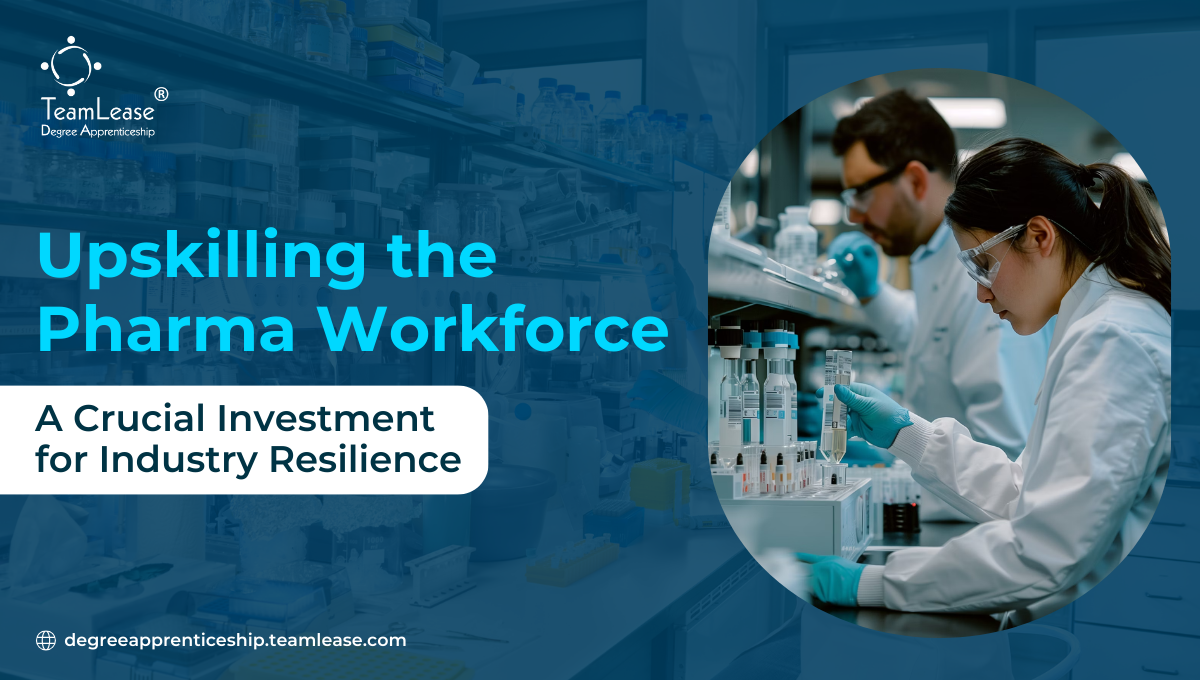The pharmaceutical industry is navigating rapid transformations, driven by innovations, regulatory changes, and a growing global healthcare demand. To remain competitive and meet the evolving needs of the market, companies must focus on upskilling the pharma workforce. This initiative ensures that employees possess the technical expertise and adaptability required to thrive in a fast-paced environment.
Sumit Kumar, Chief Strategy Officer at TeamLease Degree Apprenticeship, emphasized the critical need for upskilling and reskilling in the pharma sector. He highlighted that as India’s pharmaceutical industry grows, projected to reach $130 billion by 2030, the availability of skilled talent becomes essential to maintaining its global leadership. India’s pharma sector ranks third globally by production volume, with a robust network of drug companies and manufacturing units that supply 20-25% of the world’s generics and meet more than 50% of global vaccine demand.
Without continuous investment in upskilling the pharma workforce, sustaining this position could become challenging.
The Impact of Skilling Initiatives
Government initiatives like Make in India, the Production Linked Incentive (PLI) Scheme, and the Skill India Mission are pivotal in developing a future-ready workforce. These programs aim to address talent shortages and promote the adoption of modern technologies across the pharma manufacturing landscape. Upskilling the pharma workforce is more than just an organizational need, it’s a priority to support India’s economic growth and global standing in the pharmaceutical industry.
Sumit further explained that work-based learning programs, such as apprenticeships and degree apprenticeships, are proving to be highly effective in meeting the sector’s skilling needs. Unlike traditional education, these programs combine theoretical instruction with hands-on training, allowing apprentices to gain practical experience in real-world settings.
This approach is particularly valuable in the pharmaceutical industry, where roles such as bioprocessing technicians, regulatory affairs specialists, and quality control analysts are essential to maintaining high production standards and meeting regulatory requirements.
Why Work-Based Learning is Key
Apprenticeships and work-based learning programs have several advantages over conventional education pathways. For one, they provide immediate practical experience that enables participants to apply their theoretical knowledge in actual work environments. In industries like pharma, where precision, accuracy, and compliance with stringent regulatory standards are crucial, this blend of learning is invaluable.
Upskilling the pharma workforce through these programs ensures that employees not only understand the technical aspects of their roles but are also adept at implementing best practices to meet industry demands.
Moreover, work-based learning programs offer businesses a cost-effective solution for talent development. By investing in these initiatives, companies can reduce hiring costs, improve retention, and ensure a pipeline of skilled professionals capable of stepping into critical roles.
As the pharma industry continues to evolve, the importance of continuous workforce development cannot be overstated. Upskilling the pharma workforce will be the key to maintaining industry leadership, ensuring compliance and fostering innovation. By embracing apprenticeship programs and investing in skills development, pharmaceutical companies can build a resilient, future-ready workforce that is equipped to handle the challenges and opportunities ahead.
To learn more about how work-based learning programs can help in upskilling the pharma workforce and drive your company’s success, talk to us
The blog is an excerpt from Sumit Kumar’s discussion with Express Pharma



 Rules, 2025' 2.png)
No comments yet
Your Comment